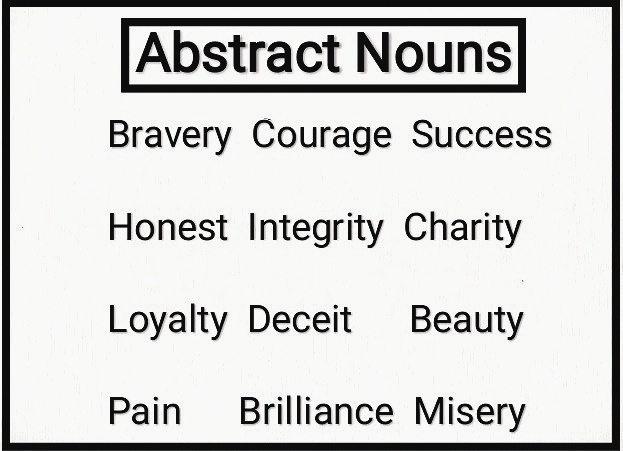What Are Abstract Nouns? Definition and Examples
You generally know that a noun is a word that refers to a place, person, thing, or idea—it's a grammar concept we learn very early in school. And of course, there are different types of nouns that we use to refer to all the things we experience in our lives: We eat food, we meet friends. We go to the store. These nouns refer to people and physical objects that we interact with.But what about things that we can't actually see or touch? Aren't words like love, victory, and alliance also nouns? Yes, they are, and there's a word you may not remember from your grade-school days when we used to refer to these things: abstract nouns.

What Are Abstract Nouns?
Nouns usually represent things (including people, places, things, and ideas). But some things are not actually things! Ideas, emotions, personality traits, and philosophical ideas don't exist in the physical world—you can't feel or interact with them—so we call them abstract nouns to distinguish them from concrete nouns.Definition of An Abstract Noun
According to the Oxford Learner's Dictionary, an abstract noun is defined as 'a noun, for example, beauty or freedom, that refers to an idea or general quality, not a physical object'. According to Collins Dictionary, 'an abstract noun refers to a quality or idea rather than a physical object.'How to Use Abstract Nouns
Abstract nouns usually describe an emotion or an idea. In English grammar, these nouns can be subject and object just like any other noun.- Emotions: Examples of common abstract nouns describing emotions include sadness, happiness, fear, anger and disgust.
- Ideas or concepts: Abstract nouns can be descriptive of abstract ideas or concepts, such as freedom, love, community, government, youth, stoicism, and cubism. These intangible concepts, which people can perceive and feel, often bring people together in conversation.
- Subjects: Like other nouns, you can use an abstract noun as the subject of the sentence. For example, in the sentence "Honesty is the best policy", the word "honesty" serves as the subject here.
- Objects: For example, “The soccer team never loses faith.” In this sentence, the abstract noun “faith” is the direct object of the sentence.
Abstract Noun Examples
Unlike most other nouns, abstract nouns do not refer to places or people. After all, people and places are real things that currently exist in our world. But, nouns that refer to fictional characters and places. For example; Godzilla or Valhalla are not, the argument goes, abstract nouns because these things would have a physical form if they were actually real.So, all abstract nouns are "things". Remember, though, that abstract nouns only refer to intangible things like emotions, ideas, philosophies, and ideas. Let's stop being abstract and look at some concrete examples so that we can understand abstract nouns better.
Here are some examples of abstract nouns that you and your kids already know:
- Anger
- Hate
- Peace
- Sympathy
- Compassion
- Bravery
- Courage
- Success
- Honest
- Integrity
- Charity
- Loyalty
- Deceit
- Beauty
- Pain
- Brilliance
- Misery
- Intelligence
- Character
- Charm
- Wisdom
- Good
- Evil
- Hope
- Generosity
However, we have a fair idea of what these words mean. But cannot experience them physically through the five senses.
Test Your Knowledge on Abstract Nouns
Let's now check how much you have learned about abstract nouns. Identify the abstract noun in the following sentences.- Honesty is the best policy.
- There is no possibility for you to reach home by six o'clock in the evening.
- This place has a really pleasant ambience.
- Pride usually goes before a fall.
- Brevity can also be the spirit of wit.
- The man is testing my patience.
- Has he read about the theory of evolution?
- Truthfulness is always appreciated.
- Friendship is priceless.
- What do you think of his idea?
- Honesty is the best policy.
- There is no possibility for you to reach home by six o'clock in the evening.
- This place has a really pleasant ambience.
- Pride usually goes before a fall.
- Brevity can also be the spirit of wit.
- The man is testing my patience.
- Has he read about the theory of evolution?
- Truthfulness is always appreciated.
- Friendship is priceless.
- What do you think of his idea?














No comments:
Post a Comment